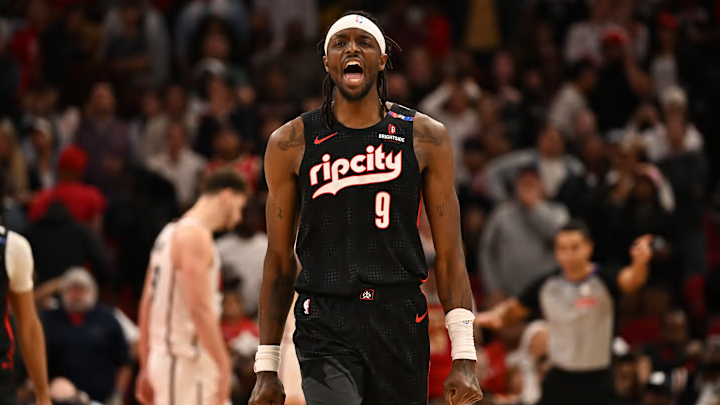The Portland Trail Blazers are impressively (and surprisingly) 8-12 after a recent home victory over the Sacramento Kings, 115-106. They've been playing relatively great basketball as of late, between the returns of Shaedon Sharpe and Robert Williams III, as well as the improved play and shooting of Deni Avdija, who is finally looking like the Washington Wizards version of the wing that Portland traded significant assets for.
The Blazers are a confusing team. Their point differential of -7.5 suggests that they are currently playing beyond their means, but that's also been skewed due to a few lackluster blowout losses. They also have a contradictory strength and weakness with their rebounding.
Strength No. 1: Offensive rebounding
The Blazers have the tallest starting lineup in the league, and that has translated into creating second-chance points in the form of offensive rebounds. That's not to mention their deep bench headlined by two centers capable of starting on several other teams: 7-foot-2 Donovan Clingan and Robert Williams III. Portland's offense is currently struggling, which also helps their offensive rebounding chances by providing them with increased opportunities due to more missed shots.
Key stats:
- 13.6 - offensive rebounds per game (fourth-best)
- 33.4 - offensive rebounding percent (fifth-best)
Strength No. 2: On-ball defense
The Blazers have a largely unfinished roster, and they are just now entering the second season of their post-Damian Lillard era rebuild. But one thing has already become apparent -- this is a team whose identity and strength lies on the defensive end.
Portland already has two former All-Defensive Team players, Williams and Matisse Thybulle (who has yet to play), and there is a chance of adding more to that list between Donovan Clingan and Toumani Camara. Avdija has also significantly boosted their level of defense with his length, agility, and versatility. The Blazers are making life difficult for opposing teams with their athleticism, size, and switchability, leading to their on-ball defense being a key roster strength.
Key stats:
- 6.5 - blocks per game (fourth-best)
- 9.1 - steals per game (tied for ninth-best)
- 16.9 - percent of points off turnovers (eighth-best)
- 16.9 - opponent's turnovers per game (fourth-best)
- 45.5 - opponent's points in the paint (tied for eighth-best)
Weakness No. 1: Playmaking
The Blazers desperately need improved playmaking, not just from their point guard but as a team overall. They have too many one-dimensional players who excel at creating their own shots rather than setting up teammates. Still, the issues start at point guard.
Both Anfernee Simons and Scoot Henderson have been highly inconsistent to start the season and unable to string together multiple games of high-level playmaking. It also doesn't help that both Simons and Dalano Banton are more score-first guards rather than floor generals.
Of the Blazers' three-point guards, Henderson is the only one with the potential to become a productive pass-first guard. But at 20 years old, he's still a few seasons away from taking over that role full-time.
Key stats:
- 10.2 - opponent's steals per game (dead last)
- 21.8 - assists per game (second-worst)
- 16.9 - turnovers per game (third-worst)
- 56.4 - assist percent (second-worst)
- 1.29 - assist-to-turnover ratio (dead last)
- 15.6 - assist ratio (dead last)
- 16.8 - turnover ratio (third-worst)
- 56.4 - percent of field goals made assisted (second-worst)
Weakness No. 2: Shooting
It's no surprise that the Blazers aren't doing well in several of the essential shooting categories. It was a glaring weakness of Portland's last season, and GM Joe Cronin did nothing to address that need this past offseason. Swapping Malcolm Brogdon for Avdija also hurts them, but Deni's shooting has significantly picked up as of late, making 40 percent of his three-point attempts in the past ten games.
Between Avdija's improved play and the Blazers' being healthier than last season, they should enhance their shooting stats compared to 2023-24. Still, it remains a massive vulnerability for Portland and is something they will aggressively need to address whenever they ultimately decide to accelerate their rebuild.
Key stats:
- 32.8 - three-point percent (fourth-worst)
- 11.6 - three-point makes (tied for fourth-worst)
- 42.8 - field goal percent (second-worst)
- 38.7 - field goals made (third-worst)
- 49.2 - effective field goal percent (dead last)
- 52.9 - true shooting percent (dead last)
Weakness No. 3: Defensive rebounding
The Blazers rank exceptionally well in offensive rebounding. As such, you'd assume they are also a sound defensive rebounding team, but that is far from the case. Although Portland is fourth-best in offensive rebounds per game (13.6), they are third-worst in defensive rebounds per game (30.4), causing them to be an average rebounding team (44.0, tied for 14th best).
Despite having elite positional rebounders like Deandre Ayton, Clingan, and Avdija, the Blazers also have some weak links, such as Jerami Grant and Simons, that prevent this from being a team strength overall.
Key stats:
- 34.5 - opponent's offensive rebounding rate (dead last)
- 12.7 - opponent's offensive rebounds per game (second-worst)
- 30.4 - defensive rebounds per game (third-worst)
- 65.5 - defensive rebounding percent (dead last)
- 15.3 - opponent's second-chance points (tied for fourth-worst)
